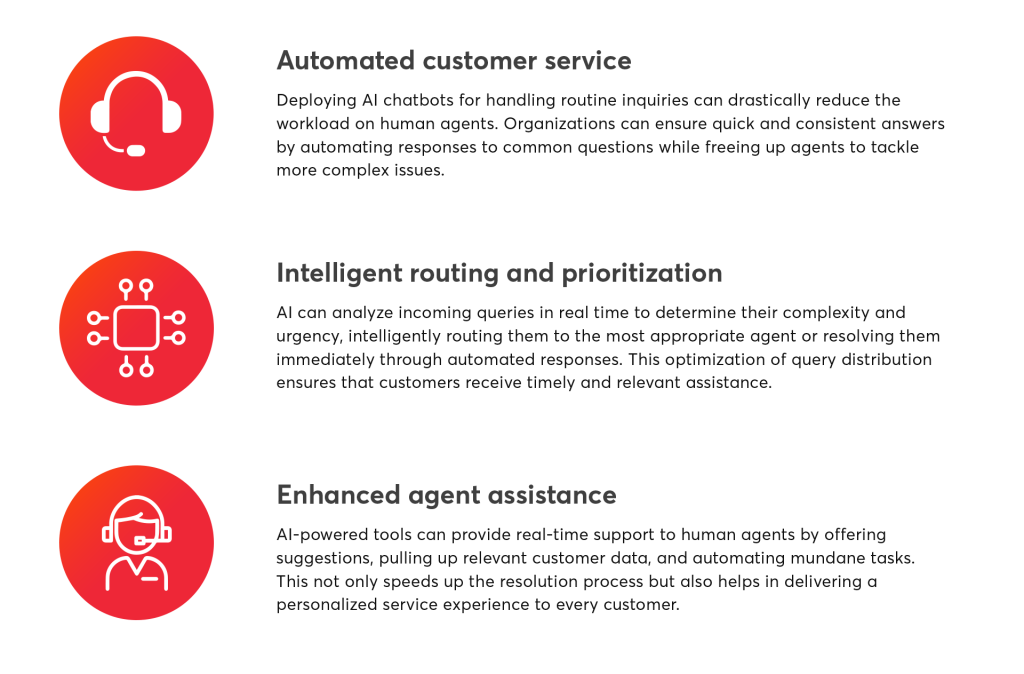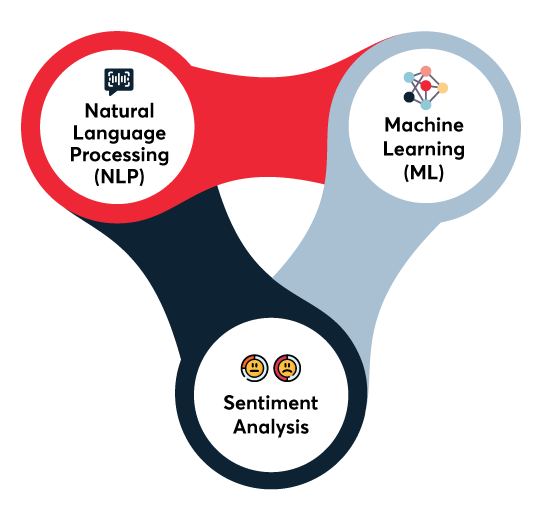Picture this: Sarah, a working mother, is trying to resolve a billing issue with her internet provider. She dials the customer service number, only to be greeted by a never-ending loop of hold music. As minutes turn into an hour, Sarah’s frustration mounts—not only is her issue unresolved, but she also feels ignored and undervalued as a customer.
Sarah’s struggle with her internet provider’s customer service highlights the inefficiencies of traditional contact centers, underscoring the critical need for modernization. AI technology, including agents and chatbots, offers a solution by ensuring instant, efficient, and personalized customer support.
Capable of handling thousands of interactions simultaneously, AI significantly cuts down response times and adapts through learning from each engagement. This not only elevates customer service quality but is also poised to save businesses nearly $11 billion, marking a substantial shift towards AI-driven customer service excellence.
Furthermore, AI-powered virtual assistants can quickly analyze and anticipate customer needs through data offering solutions in a breeze. However, the transition to AI-driven customer service has its challenges. Despite these hurdles, the potential benefits of AI and chatbots in transforming customer service are undeniable. They not only promise to modernize contact centers but also AI and chatbots are transforming the customer experience and defining the standards of customer engagement in the digital age, making scenarios like Sarah’s a thing of the past.
Challenges before AI chatbots in contact centers
Historically, contact centers have been the epicenters of customer service challenges. In an era where customer experience directly influences brand loyalty, such inefficiencies can be detrimental. Some of the common challenges before contact center modernization included:

High volume, low-efficiency
Traditional contact centers often struggle with high volumes of inquiries, leading to customer dissatisfaction. The inability to quickly process and resolve these queries efficiently results in a significant roadblock on resources and impacts overall service quality.
Inconsistent customer experience
Without AI, personalizing customer interactions at scale is a challenge. Human agents may not have immediate access to a customer’s history or preferences, leading to a disjointed experience that fails to meet the individual’s needs or expectations.
Agent burnout and attrition
Handling repetitive queries and managing tasks can lead to burnout, negatively affecting their performance and motivation. This not only impacts the quality of customer service but also leads to higher turnover rates, further destabilizing service continuity.
The evolution of contact centers – How chatbots improve customer experience?
The integration of AI and chatbots in contact centers represents a pivotal shift in the landscape of customer service, marking a significant leap toward contact center modernization.
Contact center modernization
Traditional contact centers, often criticized for their sluggish response times and reliance on manual processes, have been transformed into dynamic, data-driven hubs. AI and chatbots automate repetitive tasks, allowing for the reallocation of human resources to areas where they are most needed. This shift not only optimizes resource utilization but also ensures that contact centers can adapt swiftly to changing customer demands and market conditions.
Enhanced customer experience

By employing AI-powered chatbots, contact centers can offer 24/7 customer support, ensuring that help is always available when customers need it. This immediacy and the personalized nature of interactions greatly enhance customer satisfaction by nearly 70%.
Moreover, AI systems can analyze customer data to provide tailored recommendations and solutions, making each customer feel understood and valued. In an era where customer experience is a key differentiator for businesses, AI-enabled decision-making stands as a crucial enabler of meaningful and memorable customer interactions.
Operational efficiency
AI enhances contact center efficiency by automating routine queries and enabling agents to tackle complex issues, thereby improving service quality and reducing wait times. It offers insights into customer preferences, streamlining operations, and saving costs, leading to better and more cost-effective customer service. This includes various industries such as AI in retail, fintech, mobility, healthcare, and more.
Solutions to implementing AI chatbots in contact centers
Implementing AI in contact centers is a step towards digital transformation and revolutionizing customer service. Solutions like these ensure customers like Sarah are immediately engaged, their problems understood, and solutions provided swiftly, often without the need for human intervention.

Key technologies behind AI in contact centers
The backbone of AI in contact centers includes Natural Language Processing (NLP), machine learning, and sentiment analysis. Implementing these AI-driven solutions and technologies in contact centers not only addresses existing challenges but also paves the way for a more dynamic, responsive, and efficient customer service ecosystem.

Natural language processing (NLP)
NLP enables chatbots and virtual assistants to understand and interpret human language, allowing for more natural and engaging conversations with customers. This technology is crucial for analyzing inquiries and providing accurate, context-aware responses.
Machine learning (ML)
ML algorithms learn from data over time, improving the accuracy of responses and the efficiency of AI applications. By analyzing patterns in customer interactions, ML helps in continuously refining the AI’s understanding and problem-solving capabilities. For more information on this, check out our executive’s guide to machine learning.
Sentiment analysis
This technology assesses the emotional tone behind customer inquiries, enabling AI chatbots in contact centers to respond with empathy and adjust their approach based on the customer’s mood. Sentiment analysis plays a key role in personalizing interactions and customer satisfaction.
Virtual assistants in contact centers around the world
Globally, virtual assistants are making waves in contact centers across various industries. As the technology continues to evolve, their role becomes even more pivotal. Here are more detailed examples showcasing the impact of AI chatbots in contact centers:
North America: Macy’s On Call, powered by IBM Watson
Use Case: Macy’s, a prestigious retail giant in the United States, revolutionized customer service by launching Macy’s On Call, a cognitive mobile web tool developed in collaboration with IBM Watson. This AI-powered virtual assistant transforms the shopping experience by providing instant, accurate information on product locations, availability, and in-store services through natural language processing.
Impact: IBM Watson’s AI-enhanced Macy’s customer service, boosting engagement, and sales. Macy’s On Call provided personalized, efficient shopping assistance, bridging online and in-store experiences for a unified retail journey. With Watson’s machine learning, the service improved with every interaction, demonstrating Macy’s dedication to using advanced technology for superior customer care.
Asia: SoftBank’s Erica in Japan
Use Case: SoftBank, a leading telecom provider in Japan, leverages an AI-driven virtual assistant named Erica. Erica handles millions of customer inquiries each month, from billing questions to plan changes, with remarkable efficiency.
Impact: The deployment of Erica has dramatically reduced wait times for SoftBank customers, from several minutes to virtually instant responses. This not only ensures customer happiness but also optimizes the workload on human agents, allowing them to focus on more complex customer needs.
Europe: Swedbank’s Nina in Sweden
Use Case: Swedbank, one of the largest banks in Sweden, introduced Nina, a virtual assistant designed to process customer transactions and inquiries around the clock. Nina assists customers with various services, from account balance inquiries to transaction processing.
Impact: Nina has been instrumental in offering a seamless banking experience, handling over 30,000 conversations monthly and successfully resolving the majority of inquiries without human intervention. This 24/7 availability has significantly improved customer engagement and efficiency.
These examples illustrate the global reach and versatility of AI-powered virtual assistants in enhancing customer service across industries. By providing instant, accurate, and personalized assistance, these virtual agents also streamline operations and contribute to significant cost savings for businesses.
The future of AI in contact centers
Companies like VentureDive are leading this transformation with advanced AI and ML solutions, including chatbots and virtual assistants, aimed at elevating customer service to new heights. These technologies are revolutionizing contact centers by tackling issues of efficiency, personalization, and scalability, making them essential for businesses aiming to excel in the digital era and provide unmatched customer service.
